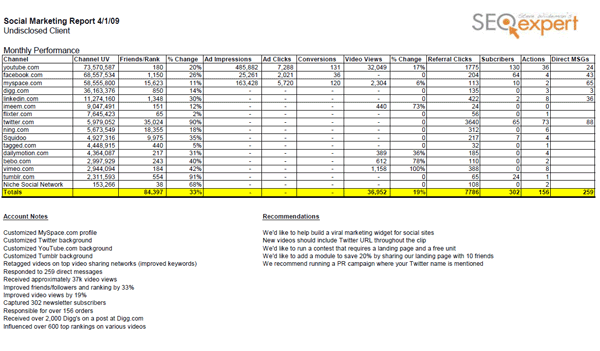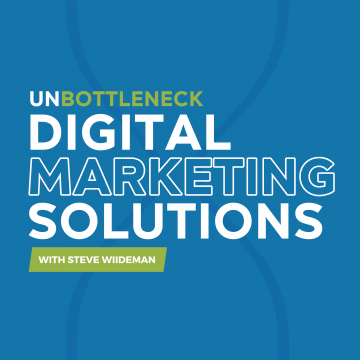A friend of ours on Twitter recently asked about a Tweet we posted regarding not wanting to have the job of Social Community Manager (SCM), so we thought it prudent to write a post on the topic of Social Networking and hiring a part-time or dedicated SCM.
Why Hire a Social Community Manager?
If you use an productivity application such as ManicTime or RescueTime, you may be shocked to see the amount of time you are spending trying to build and maintain your presence on social networking websites. What you might not notice is the limited amount of leads and sales you’ve been driving from Social in your Google Analytics (or other web analytic program). Don’t bother logging in to check, because the number will be less than 4%.
So when all is said and done, you have to account for those hours and your market rate for whatever it is you do at your job. For a lawyer who makes $400 per hour to spend 20 hours per month (5 hours per week) on Twitter, YouTube, or Facebook, that’s a cost of $8,000 per month. For Joe Marketing Coordinator, his hourly rate is around $31 per hour. If he spent 20 hours per month on social networking, the cost would be $620 per month, in addition to the production/operations work that isn’t being handled during those 20 hours.
Neither the lawyer or the marketer in the example above have any training on how to monetize social efforts, so for the most part it’s just time wasting. Therefore, hiring a Social Community Manager trained in the art of growing, nurturing and executing viral marketing campaigns across various social platforms would be a much more efficient use of marketing budget (versus sacrificing internal resource time to the Gods of Time Wasting).
What Does a SCM Do Exactly?
Aside from spending 25% of their day getting better at what they do, a SCM is responsible for Brand Awareness and improving Online Market Reach by getting as many eyes to see the company they provide services to through various mediums, such as video, Flash media, bulletins/posts, widgets, direct communications and more. An effective campaign will not only encourage the community members to visit the target website (and make a purchase or inquiry), but will also spawn a viral marketing epidemic that’s too good not to share with others; such as the Elf Yourself campaign by OfficeMax in 2007.
At the end of the month and/or campaign, the Social Community Manager is accountable to providing detailed analytical data on the following deliverables:
SCM Deliverables:
- Reach / Impressions and Growth Rate
- Member Count and Growth Rate
- Traffic Generated From Social Networks
- Leads / Sales Generated from Social Networks (Web Analytics)
- Overall Campaign Performance & Recommendations
Think with the End in Mind (Covey)
Having a goal isn’t just telling your SCM that you want more leads and/or sales. It’s more complicated then ROI because the ROI from a brand awareness campaign is very difficult to measure. Here’s our recommendation: There is no end, there is just growth. Don’t tell your SCM that you expect a tree 20 feet tall that produces 50 apples per month. Instead, tell your community manager that you want a solid foundation, a rotation of out-of-the-box campaigns/offers, and continuous growth in visibility at a rate of 15% or higher per month.
Your reports will tell all and should look something like the below:
Social Marketing Report Sample:
Resources and Tactics Involved
The resources required to optimize and accelerate a Social Marketing Campaign include the Community Manager, clickers, voters/raters, Digg’ers, bloggers, passive friend-adders, comment-writers, WordPress, Technorati, Feedburner, and when possible a celebrity to to help create the initial spark.
Tactics managed by the Social Community Manager may include:
- Creating profiles on the most popular social websites and relevant niche sites
- Customizing/designing profile themes and backgrounds
- Integration/syndication between all social profiles
- Business support to add social buttons to the target website
- Managing contests and promotions
- Managing widget-makers and influencing mass-adoption
- Managing & paying reviewers, voters, raters, and comment-writing vendors
- Having access to and generating reports from web analytics application
- Researching strategy and competition to build an out-of-the-box campaign
- Consulting and making recommendations for further growth of friends/views/clicks
- Managing and redirecting direct messages from social websites
- Coding, recoding, and keyword optimizing video and Flash media
- Syndicating/distributing video content semi-automatically
- Being cool to work with
Still Want to “Do the Social Thing” Yourself?
We recommend hiring a Social Community Manager if you’re really interested in using a social networking strategy as an advertising platform. Otherwise, limit your time and who you follow to just those people in your industry who will help you to grow at an individual level. As SEO Experts, here are a few of the people we follow, some on our mobile devices:
- @graywolf
- @affiliatesummit
- @mikefilsaime
- @seomoz
- @SpyFu
- @garyvee
- @bradcallen
- @randfish
- @dannysullivan
- @TerryCox
- @mckennasmark
- @ericward
- @aaronwall
- @mattcutts
- @seochick
- @dennisyu
- @sengineland
- @DeniseWakeman
- @BradFallon
- @BenGerstein
- @drodecker
Of course you may want to follow us as well (@wiideman) to keep up with industry trends and see discussions on search engine optimization, social marketing optimization, and other Internet marketing facets.
Now Go Out There & Find a Social Community Manager!
We hope we provided enough information and resources above to plan and deploy an effective Social Marketing Optimization (SMO) strategy. Happy socializing!





